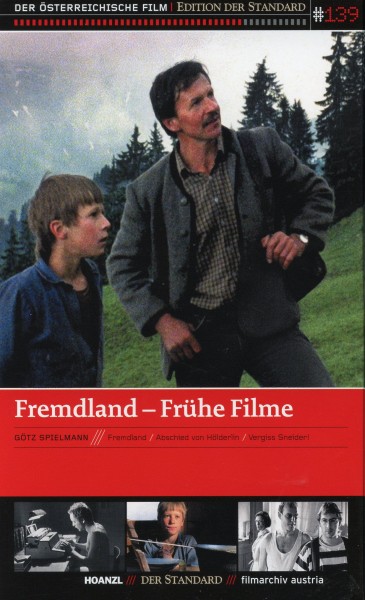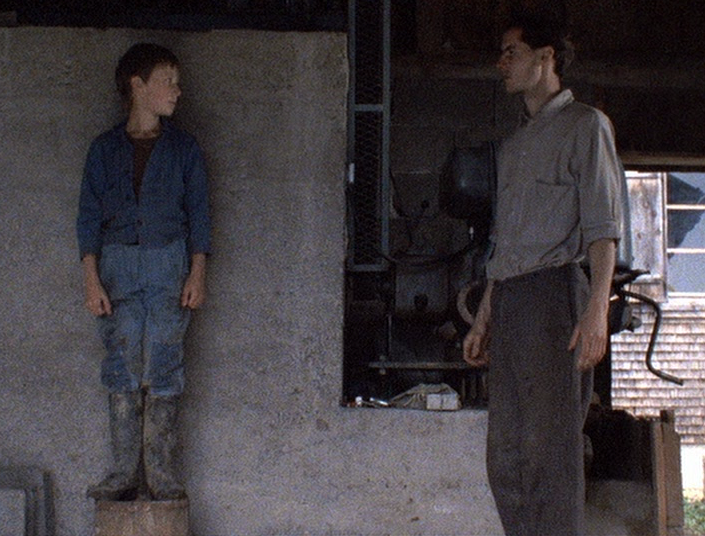

“This will all be mine one day.”
Fremdland is the debut student short from Götz Spielmann, director of the excellent revenge drama Revanche (2008). Filming took only a few weeks and utilized a small group from Filmacademy Vienna (Filmakademie Wien) where Spielmann was a student.1 The short was filmed in a remote location in the pastoral mountains of Switzerland, and the crew was cut off from communication with the outside world except for the cable car that features in the film. Without modern amenities like hot water and electricity, the filmmakers had nothing to do but make a film. It sounds very romantic, and the resulting short is actually pretty good. Like many such projects, it ends up feeling incomplete—more an exercise than an attempt at crafting an artistic statement. The film was awarded the Jury Award at the Munich International Festival of Film Schools in 1985.
The film is a 45 minute character study of Stefan (Johannes Matzler), a young boy who is the son of an Alpine farmer (Anton Meusburger). Each summer the cattle are driven to the mountain regions to graze, and this summer Stefan is along to help. He learns to clean stables and milk cows, but when his father has to go away for a week, he is told that his primary responsibility is to keep the cows from wandering over the edge of the cliff. Left under the watchful eye of an introverted farmhand (Wernfried Natter), Stefan keeps himself occupied by making games of his chores. He builds fires, corrals the cows for milking, feeds the pigs, and washes dishes. He does it all with playfulness, snorting back at the pigs, chasing a cow and blowing a harmonica at it, and balancing a stack of dishes one atop the other until they tumble onto the cabin floor.
The pair’s lonesome existence is briefly interrupted by a couple of tourists that trek up from a distant hotel. The farmhand offers them a drink, but his disquieting gaze and disinterest in conversation cut the surprise visit short. After they leave, the solitude begins to weigh on Stefan. He has already drawn a picture of his friends ice-skating, commenting that they are probably swimming by now while he is stuck up in the mountains undergoing his rite of passage to be his father’s successor. Though the farmhand is diligent in his own duties, he is a dreadful companion, scolding Stefan for singing, ignoring his questions, and browsing lewd magazines while Stefan wanders alone outside.

Facing extreme discomfort with the arrangement, Stefan tries to leave in the middle of the night. Riding the cable car—which must be stopped by an operator else it will crash into the wall at the bottom—Stefan plans to jump off just before the end in order to arrive safely. The farmhand is awakened by the sound of the motor running and quickly reverses the cable, bringing Stefan back to the mountains where he is scolded and sent to bed.
Like many student films, Fremdland feels incomplete, as if the filmmakers’ main goal was to sharpen their skills and grow professionally. While that may be true, this debut effort from Spielmann is very well made. The cinematography beautifully captures the Swiss mountains in a pleasant graininess, and the editing and pacing build the character of Stefan adequately despite the short runtime. And Spielmann has a real eye for image composition. Despite a limited budget, Spielmann wrings a lot out of the natural landscape and his actors.
1. Spielmann currently teaches at Filmakademie Wien along with fellow Austrian director Michael Haneke.
Sources:
Claudia Walkensteiner-Preschl. “Preserving and Fostering Self-Will”. Filmakademie Wien.
I need to point out that over-all I’m pretty taken with this web-site. It’s very clear that you are aware of your subject matter and you are enthusiastic about it. I wish I possessed your ability to write. I look forward to reading your work.